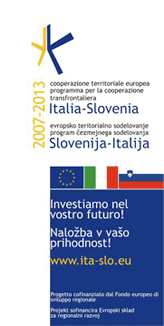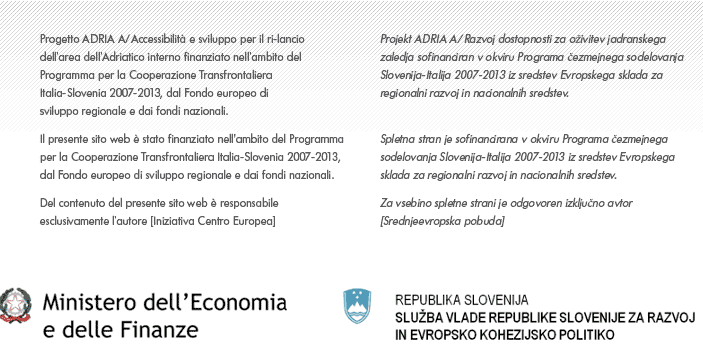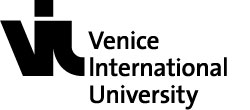Accessibility and Development for the Re-launch of the Inner Adriatic Area (2010/2013)
Sector: Logistic and Transport
Program: Interreg Italia Slovenia
Project website: www.adria-a.eu
Facebook page:https://www.
The project aims at creating a metropolitan area between the Italian and Slovenian border, thanks to the integration of Slovenia in the Shengen area. The integration between the two areas in one macro area allows citizens and territory to augment its level of fruition. the urban areas of Trieste and Capodistria, the port of Gorizia and Nova Gorica, the airports of Venice, Ronchi dei Legionari and Lubiana will be linked together by a railway ring that will be completed around those areas. The transport issue is analized form several point of views in a global vision capable to link ports adn airports as a territorial network. The governance of this transnational territorial system requires an institutional network able to work together as a whole territorial system.
Partners: Central European Initiative (lead Partner); Venice International University, Regione Friuli Venezia Giulia, Regione Veneto, Province of Trieste, City of Venice, City of Koper, City of Nova Gorica, City of Trieste, City of Divača, City of Monfalcone, City of Sežana, Airport of Ronchi dei Legionari, Airport of Potorož, Airport of Venice, Airport of Lubiana, Port of Trieste, Turismo FVG, Slovenian Tourism Board, Port of Koper, Ezit, University of Trieste, University Koper/Portorose, City of Gorizia
 |
 |
Other useful pages of interest:
Edits: https://www.facebook.com/
RAIL4SEE: https://www.facebook.com/
ACROSSEE: http://
The aim of the project was to experiment and test new research tools capable of supporting the study regarding professional communities in the economic organizations.
From a methodological point of view these tools were studied in their descriptive (capability of describing a predetermined context) and prescriptive meaning (capability of suggesting actions in order to modify that context).
On one hand the project intended to contribute to the emergent studies of Knowledge management and specifically to those which consider the communities of practices as an elective social device to produce learning, meaning and identity, at least Knowledge. On the other hand many were the potential applications within and between organizations.
From a technological point of view the research consisted in creating:
- On Line Collaborative Spaces based on the emerging theoretical and methodological elements;
- Research Engine capable of embodying "Intelligence" and "Wisdom" in the selection and the search of information, rather than meanings;
- a Connection between these research elements and the real organizational context.
Project Leader - Venice International University
Project Partners
Arthur Andersen MBA
Università di Trento
Universita Ca' Foscari Venezia
Compaq
Lotus
For further information please see available documents:
Wil Project and Wil Project Proceedings
Leonardo Da Vinci Programme, Community Vocational Training Action Programme
This project, co-financed by the European Commission, was addressed to young graduates (coming from Universitat Autònoma de Barcelona, Ludwig Maximilians Universität of Munich, and Ca' Foscari University of Venice) that had the opportunity to participate in a stage (for a maximum of sixth months). A total of 81 students, coming from the three partner Universities, had access to this training opportunity.
NeMaNIS 1999 focused on the specific training of young new managers to be inserted in SMEs with different professional profiles. The program was also devoted to reduce the gap between the theoretical knowledge of students and young graduates and the specific skills required by the SMEs.The stage activities together with the pre-stage training aimed at increasing the complementarity of the organisation skills of the European SMEs, in order to facilitate the free mobility of the European new managers in the work world. The vocational training proposed was devoted to students and young graduates in the areas of Sciences, Economics, Computer Sciences. The professional profiles to be considered were the following:
Environmental Consultant
The environmental impact of the production and the consequent costs for the use of technologies to prevent the pollution are very heavy for SMEs without specific structures. The aim of the vocational training proposed was to increase the practical skills to be transmitted to the SMEs for the adoption and adaptation of environmental protection technologies.
Expert in Computer Sciences for the management of automated production and support services for SMEs
The possibility of SME to be competitive in the market is strictly related to its capacity of acquiring new technologies for the implementation of the general organisation and the quality of the final product. The SME can reach these objectives by means of young managers devoted to the development and/or modification of software for the automatic production processes and the administration of the enterprise. The vocational training was devoted to students and young graduates who would develop new skills in small and big European enterprises where the computerised organisation of the production and the management are continuously upgraded.
Economics and Management
Business administration with particular reference to the new needs emerging out of the globalization process. In particular the impact of NITs on the management of SME’s.
Lead Partner: Ca’ Foscari University
Project financed by the Italian Ministry of Work (1999-2000). The project was devoted to experimenting innovative methodologies for continuous training destined to employ waged workers. The project focused on supporting the growth of professional Knowledge families, with specific attention to professional operators, activating 4 professional communities that found in the net the main tool of coordination and information exchange. The professional communities’ web site was a place of training, discussion, comparison for professionals already working in Italian SMEs.
The project aimed at creating professional knowledge through the activation of professional communities that found on the web the main tool for their coordination and a way to exchange information. The professional communiy on the web is the natural meetign point of professionals that cannot find in their firms occasions of growth and that want to use the ICT for their continuing training. Professional Communities on the web are:
· a place of customed training
· a place for qualified services provided by several institutions like Universities, consultants, training centers
· a place for discussion forum addressed to professionals
· a place for the knowledge production through the selection and the editing of materials produced by the members of the community
Lead Partner: Fondazione CUOA
Leonardo da Vinci - Community Vocational Training Action Programme
Financed by the European Union within the Community Leonardo da Vinci Programme and in cooperation with: CILI - Cambridge International Land Institute, RICS - The Royal Institution of Chartered Surveyors.
The project involved an international community of Real Estate Evaluation professors and researchers and provided them training with distance learning tools. The role of VIU, partner of the project, was to provide:
- multimedia documents, training methodologies and case studies in Distance Learning under the scientific supervision of the Istituto University of Architecture of Venice - Urbanistic Department;
- structures for workshops and international meetings.
This proposal arose from the experience of training needs undertaken by the professional organisations. The project tried to develop ICT methods for Continuous Professional Development (CPD) for professionals working in the Real Estate Sector. The training market is very large across Europe - in the UK alone the Royal Society of Chartered Surveyors has a membership of around 80,000.
The project addressed the following training issues:
- Members of the professional organizations are often geographically and professionally isolated, with limited opportunities for experience and poor access to quality postgraduate professional training and support. This has resulted in most EU countries, to an unequal provision for continuing professional development;
- Individuals need to be able to continuously upgrade their skills and knowledge necessary for business creation, growth and individual success, and to meet rising professional quality control standards;
- Early and mid-career professionals find it difficult to take time away from work (and family) in order to acquire such new knowledge and skills (this is not uncommon in a number of professions);
- These skills and knowledge have to be deployed increasingly working with other professionals in a context driven by the development of the European single market; electronic commerce and e busines;
- Within the profession there is a considerable knowledge and skills base which is difficult to access by many of the practising members, particularly at a European level.
The project developed, at a European level, an ICT based Corporate Professional Knowledge Base and Corporate Professional Knowledge Network to support online on-the-job distance Postgraduate level Continuing Professional Development for Real Estate professionals.
Lead Patner: RICS - The Royal Institution of Chartered Surveyors




















